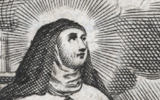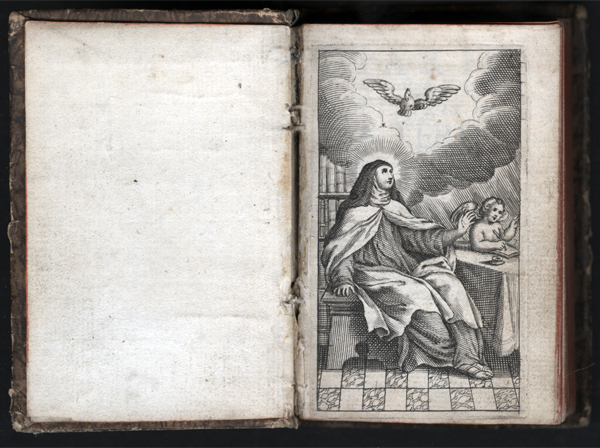
This year marks the 500th anniversary of the birth of Teresa de Ávila, one of the most dynamic and innovative of the sixteenth-century mystics. The Library, along with several partners, is celebrating this momentous anniversary with an exhibition and two events on the life and impact of Teresa.
Although Teresa did not initially intend to become a nun, she eventually changed her mind and entered the Carmelite convent of the Incarnation in 1536. After a few decades as a nun, Teresa began to have intense supernatural experiences. Some dismissed her experiences as demonic, but her Jesuit confessors encouraged her to practice mental prayer and to meditate on the humanity of Christ, probably introducing her to the Spiritual Exercises of Saint Ignatius.
Teresa’s emphasis on interiority and mental prayer led her, in 1562, to found a new convent, San José. Known as Discalced Carmelites (or Barefoot Carmelites), the San José nuns remained cloistered and practiced mental prayer. Teresa went on to found another Discalced convent in Seville and worked with John of the Cross to found a friary at Duruelos. Pope Gregory XIII made the Discalced Carmelites a separate province in 1580, two years before Teresa’s death. Today, Discalced Carmelite convents exist throughout the world.
An avid reader and writer throughout her life, Teresa produced four treatises and hundreds of letters, as well as mediations and essays. The Georgetown University Library has an extensive collection of these materials and other materials about Teresa, as well one of the most significant collections of early Discalced Carmelite documents in the area. These items include the extremely rare first edition of the works of Saint Teresa (1588), edited by Fray Luis de León, as well as the 1606 biography by Diego de Yepes.
In honor of Saint Teresa’s 500th birthday, the Booth Family Center for Special Collections is hosting an exhibition of these items, curated by Bárbara Mujica, Professor in the Department of Spanish and Portuguese. The exhibition, which can also be explored online, is available for visitors to view in the Special Collections Gallery on the fifth floor of Lauinger Library through December 18.
In addition, the Library Associates are hosting the annual Casey-McIlvane Memorial Lecture on the evening of October 15 featuring Professor Mujica, one of the most renowned Teresian scholars in the world, on the topic Was Saint Teresa a Feminist? Mujica has written two scholarly studies of Teresa de Ávila: Teresa de Ávila, Woman of Letters and Teresa de Jesús: Espiritualidad y feminismo, and a novel, Sister Teresa, among several other books and articles. She has lectured widely on Saint Teresa, and presents a fascinating perspective on this provocative topic.
The following day, October 16, the Library is co-presenting a full day commemoration on Saint Teresa. The event will include a symposium featuring the most respected Teresian scholars in the country; a viewing of the exhibition in the Booth Family Center for Special Collections; a concert of Spanish music by the Georgetown University Orchestra; and scenes from a play, God’s Gypsy, by Coco Blignaut, based on Mujica’s novel Sister Teresa. The day’s activities will feature Georgetown faculty and Performing Arts students and are all free and open to the public. The full schedule and RSVP information are available on the Library’s website. This event is sponsored by the Department of Spanish and Portuguese, the Georgetown University Library, the Casey-McIlvane Memorial Lecture Fund, Georgetown College, the Department of Performing Arts, the Carmelitana Collection at Whitefriars Hall in Washington D.C., and the Embassy of Spain.
Saint Teresa, as a woman and as a saint, is a fascinating figure in Catholic history. Come learn more about her life and legacy!
Accommodation requests related to a disability should be made at least 5 business days prior to these events by filling out the request form at library.georgetown.edu/ar or calling 202-687-7446. The Library will consider and make reasonable efforts to fulfill requests for accommodation.

Teresa of Avila. Diario cavato da i scritti di S.Teresa, gran maestra di Spirito: vtilissimo a chi desidera a fare profitto nella vita spiritual / scritto dal r. prete Giovanni Zucchetti; aggiuntoui gli atti interni di virtù con alcune esclamations à Dio praticati, e scritti dalla serafica verg (Daily Readings Taken from the Writings of Saint Teresa, a great teacher of spirituality: highly useful for whoever wants to profit from the spiritual life; written down by the reverend father Giovanni Zucchetti; also the internal acts of virtue with some exhortations to God the practicant can do; and writings from the seraphic virgin). Venice: Appresso Antonio Bosio, 1680.
With engraved frontispiece of Teresa and engraved portrait of John of the Cross. A daily prayer guide, probably owned by an Italian noblewoman, with excerpts from the works of Teresa de Avila. Also includes excerpts from John of the Cross. Open to an image of the Holy Spirit inspiring Saint Teresa as she dictates her thoughts to an angel. Because many priests thought that a woman could never possess the theological sophistication that Teresa displays in her writing, she is often depicted writing through the inspiration of God rather than as using her own ingenuity. See the full exhibition.
